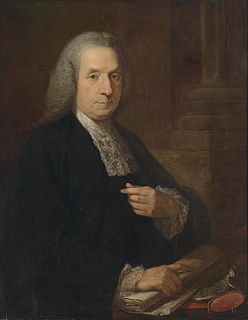Related Research Articles

The Inns of Court in London are the professional associations for barristers in England and Wales. There are four Inns of Court – Gray's Inn, Lincoln's Inn, Inner Temple and Middle Temple.
A serjeant-at-arms, or sergeant-at-arms, is an officer appointed by a deliberative body, usually a legislature, to keep order during its meetings. The word "serjeant" is derived from the Latin serviens, which means "servant". Historically, serjeants-at-arms were armed men retained by English lords and monarchs, and the ceremonial maces which they are associated with were originally a type of weapon.

The Solicitor-General for Ireland was the holder of an Irish and then United Kingdom government office. The holder was a deputy to the Attorney-General for Ireland, and advised the Crown on Irish legal matters. On rare occasions, there was also a Deputy Attorney-General, who was distinct from the Solicitor-General.At least two holders of the office, Patrick Barnewall (1534–1550) and Sir Roger Wilbraham (1586-1603), played a leading role in Government, although in Barnewall's case this may be partly because he was also King's Serjeant. As with the Solicitor General for England and Wales, the Solicitor-General for Ireland was usually a barrister rather than a solicitor.

A Serjeant-at-Law (SL), commonly known simply as a Serjeant, was a member of an order of barristers at the English and Irish Bar. The position of Serjeant-at-Law, or Sergeant-Counter, was centuries old; there are writs dating to 1300 which identify them as descended from figures in France before the Norman Conquest, thus the Serjeants are said to be the oldest formally created order in England. The order rose during the 16th century as a small, elite group of lawyers who took much of the work in the central common law courts.

The Attorney-General for Ireland was an Irish and then United Kingdom government office-holder. He was senior in rank to the Solicitor-General for Ireland: both advised the Crown on Irish legal matters. With the establishment of the Irish Free State in 1922, the duties of the Attorney-General and Solicitor-General for Ireland were taken over by the Attorney General of Ireland. The office of Solicitor-General for Ireland was abolished for reasons of economy. This led to repeated complaints from the first Attorney General of Ireland, Hugh Kennedy, about the "immense volume of work" which he was now forced to deal with single-handed.
Craig Stanton Serjeant is a former Australian cricketer who played in 12 Test matches and three One Day Internationals in 1977 and 1978.

The Common Serjeant of London is an ancient British legal office, first recorded in 1291, and is the second most senior permanent judge of the Central Criminal Court after the Recorder of London, acting as deputy to that office, and sitting as a judge in the trial of criminal offences.
Robert Skinner was an English bishop successively of Bristol, of Oxford, and of Worcester.
The Serjeant at Arms of the British House of Commons is a parliamentary official responsible for order in the House of Commons. The office dates to 1415 and traditionally included responsibility for security. The role is now mainly ceremonial.
This is a list of lawyers who held the rank of serjeant-at-law at the Irish Bar.

Philip Tisdall SL was an Irish lawyer and politician, who held the office of Attorney-General for Ireland. He was for many years a leading figure in the Irish Government.
Henry Singleton (1682–1759) was an Irish politician and judge, who is remembered now mainly for his friendship with Jonathan Swift, and for his notable acts of charity during the Great Irish Famine of 1740-1, in which between 300,000 and 500,000 people died. Singleton House, his impressive townhouse in Drogheda, no longer exists.

Walter Hussey Burgh SL was an Irish statesman, barrister and judge who sat in the Irish House of Commons, served as Prime Serjeant and Chief Baron of the Irish Exchequer (1782–83) and was considered to be one of the outstanding orators of his time.
Sir Richard Ryves (1643–1693) was a seventeenth-century Irish judge who served for several years as Recorder of Dublin, and subsequently as a Baron of the Exchequer.

William Frere, was an English lawyer and academic, a law-serjeant and Master of Downing College, Cambridge.
Serjeant was a British Thoroughbred racehorse. In a career that lasted from spring 1784 to autumn 1787 he ran sixteen times and won eight races. In 1784 he won the fifth Epsom Derby, the first running of the race under its current name and distance. He stayed in training for a further three seasons, winning several important races at Newmarket, but disappeared from official records after his retirement from racing and does not appear to have been found a place at stud.

Sir John Silvester, 1st Baronet, FRS, FSA, DCL, was an English lawyer and Common Serjeant of London from 1790 to 1803, and Recorder of London from 1803 until his death in 1822.
The New Year Honours 1915 were appointments by King George V to various orders and honours to reward and highlight good works by members of the British Empire. They were announced on 1 January 1915.
Sir Thomas Pakenham (1649-1703) was an Irish barrister and politician: he sat in the Irish House of Commons as MP for Augher and held the office of Serjeant-at-law (Ireland). He was the grandfather of the first Baron Longford.
Philip Charles Angus Moon QC is a barrister and joint head of Serjeant's Inn chambers, London. He was called to Bar 1986 and was appointed as a Queen's Counsel in 2006. He works in a wide range of fields including medical negligence, employment, Court of Protection, inquests, police and public and regulatory law. He is married to Florence and they have 4 children. He has 5 brothers and a sister.
References
- ↑ "Philip Serjeant". Sports Reference. Archived from the original on 17 April 2020. Retrieved 22 February 2016.